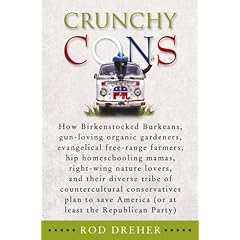Prince Charles, Crunchy Con?
The latest issue of National Geographic contains an article titled Prince Charles - Not Your Typical Radical, which outlines some of his efforts at promoting sustainable agriculture and pedestrian-friendly communities in the land holdings he manages as the Duke of Cornwall. He's got a lot of ideas a Crunchy Con would love:
Prince Charles gave no warning that he was about to abandon his usual restraint. He simply began slicing the air with his hands as his voice rose in frustration: "I had witnessed this appalling horror of the 1960s, when everything was thrown away, denigrated, abandoned. I watched as woods were cut down, hedges uprooted, wonderful old buildings knocked down. I minded dreadfully.But then again:
"My whole aim was to repair the damage, to heal the wounds, as it were, of the countryside." Calmer now, his voice falling to its usual hoarse whisper, he settled back in the silk armchair, smoothing his flawless blue suit. Meanwhile, the uniformed footman at Clarence House, the prince's London mansion, went about his business, sliding in and out of the drawing room.
One day Prince Charles, now 57, will be crowned king (his mother is already 80). Judging from the way he has handled his inheritance so far—more than 135,000 acres of mostly rural land known as the Duchy of Cornwall—the country may be in for some surprises. He has used this private little kingdom as a place to test solutions to the problems of modernity, for the prince believes, fervently, that life in both town and country has gone awry.
The duchy provides the prince's entire annual income—13.2 million pounds (23.5 million dollars) in 2004—which covers most of the cost of his official duties, his charitable activities, and all his private expenses. It is money that comes as rent from roughly 250 tenanted farms and from, among many other sources, transatlantic undersea fiber-optic cables and a gay bar in London. [Emphasis mine]"Crunchy" he may be, but "Con", probably not...




